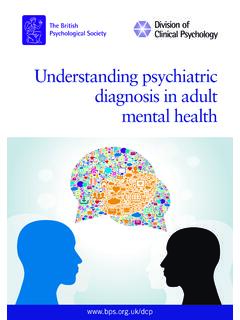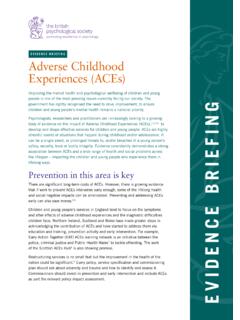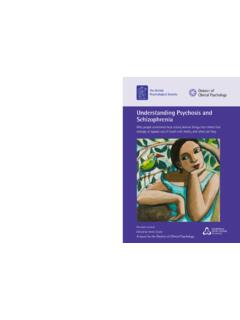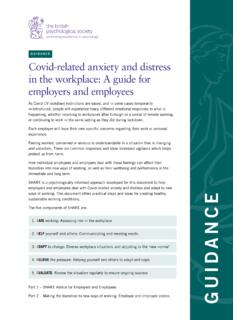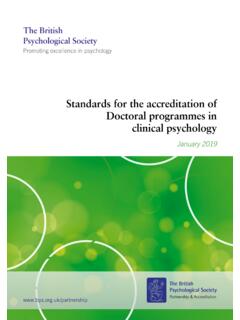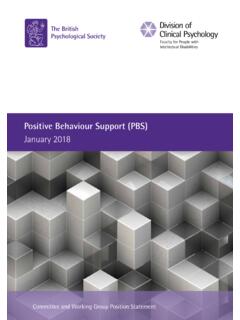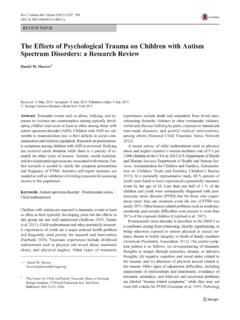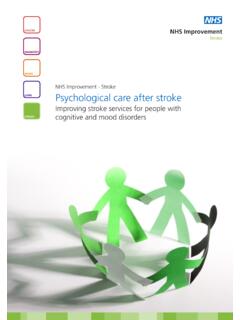Transcription of Standards for the accreditation of psychological wellbeing ...
1 For the accreditation of psychological wellbeing practitioner training programmesJanuary 2019 The British psychological Society Promoting excellence in psychology Printed and published by the British psychological Society. The British psychological Society 2019 Incorporated by Royal Charter Registered Charity No 229642If you have problems reading this document because of a visual impairment and would like it in a different format, please contact us with your specific : +44 (0)116 252 9523; E-mail: all other enquires please contact the Society on:Tel: +44 (0)116 254 9568; E-mail: usIf you have any questions about accreditation through Partnership, or the process that applies to you please feel free to contact the Partnership and accreditation Team: E-mail: +44 (0)116 252 9563 Our address is:Partnership and accreditation TeamThe British psychological SocietySt Andrews House48 Princess Road East LeicesterLE1 7DR 3accreditation through partnershipContents4 Introduction4 What is accreditation ?
2 4 Benefits of accreditation4 Our standards5 This document6 The core training of a psychological wellbeing practitioner: Statement of intent8 Programme standard 1: Programme design11 Programme standard 2: Programme content (learning, research and practice)22 Programme standard 3: Working ethically and legally23 Programme standard 4: Selection and admissions25 Programme standard 5: Student development and professional membership26 Programme standard 6: Academic leadership and programme delivery30 Programme standard 7: Discipline-specific Programme standard 8: Quality management and governance33 Appendix 1: Module Delivery34 Appendix 2: Module assessment strategy British psychological Society ( the Society ) is the learned and professional body, incorporated by Royal Charter, for psychology in the United Kingdom. The key objective of the Society is to promote the advancement and diffusion of the knowledge of psychology pure and applied and especially to promote the efficiency and usefulness of members by setting up a high standard of professional education and knowledge.
3 The purpose of the Society s accreditation process is to further that is accreditation ? accreditation through Partnership is the process by which the British psychological Society works with education providers to ensure quality Standards in education and training are met by all programmes on an ongoing basis. Our approach to accreditation is based on partnership rather than policing, and we emphasise working collaboratively with programme providers through open, constructive dialogue that allows for exploration, development and quality enhancement. Benefits of accreditationDelivering a programme that meets the Standards required for accreditation is a significant commitment, and there are many reasons why Society accreditation is worth your investment of time and money: It is a highly regarded marker of quality that prospective students and employers value.
4 It enhances the marketability of your programmes. It gives your graduates a route to Society membership, an integral part of students development as psychologists, or as part of the wider psychological workforce. It is a high quality benchmarking process aimed at getting the best out of programmes. It provides an opportunity for you and your students to influence the society and its support for education providers and students. Together we have a powerful voice in raising the profile of psychology and psychological practice in the UK and standardsIn 2017, the Society s Partnership and accreditation Committee (PAC) and its constituent Education and Training Committees reviewed the overarching programme Standards , with the aim of providing greater clarity and more effective signposting to other relevant guidance in a way that is helpful to programmes when they articulate their work.
5 Our Standards are intended to be interpreted and applied flexibly, in a way that enables programmes to develop distinctive identities that make the most of particular strengths shared by their staff team, or those that are reflected in the strategic priorities of their department or university. During partnership visits, the questions that visiting teams will ask will be designed specifically to give education providers every opportunity to confirm their achievement of the Standards are organised around eight overarching Standards , as follows: 5accreditation through partnershipThe Standards have been derived following extensive consultation between the Society and education providers, and must be achieved by all accredited programmes. Each overarching standard is followed by a rationale for its inclusion, together with guidance and signposting of other relevant documentThis document sets out the accreditation Standards for the accreditation of psychological wellbeing practitioner training programmes.
6 The Standards came into operation on 1 October you are submitting a new programme for accreditation , or are preparing for an accreditation visit or review, you should read these Standards in conjunction with the relevant process handbook. All handbooks can be downloaded from programmes produce graduates whose competencies are consistent with the national requirements for the training of psychological wellbeing Practitioners. Graduates who are Society members or subscribers are eligible to apply for entry on to the Society s PWP Programme design5. Student/trainee development & professional membership2. Programme content3. Working ethically & legally4. Selection & admissions6. Academic leadership & programme delivery7. Discipline-specific resources8. Quality management & governance core training of a psychological wellbeing practitioner: Statement of intentPsychological wellbeing Practitioner training programmes provide the knowledge and professional skills for people to work as psychological wellbeing Practitioners (PWPs) with people with common mental health problems.
7 The PWP role was originally developed to work within Improving Access to psychological therapies (IAPT) services in England, providing assessment and low-intensity interventions, and PWP training programmes accordingly prepare people to work as PWPs in IAPT services . PWP training programmes in other nations may prepare people to work in analogous roles in primary care mental health wellbeing Practitioners are trained to assess and support people with common mental health problems principally anxiety disorders and depression in the self-management of their recovery. Interventions are designed to aid clinical improvement and social inclusion, including return to work, meaningful activity or other occupational activities. PWPs do this through the provision of information and support for evidence-based low-intensity psychological treatments, mainly informed by cognitive-behavioural principles, but also include physical exercise and supporting medication adherence.
8 Behaviour change theory and models provide the framework which support an integrated approach to the choice and delivery of the interventions that PWPs Institute for Health and Care Excellence (NICE) guidance for common mental health disorders and for each of the anxiety disorders and depression sets out the range of different types of low-intensity evidence-based interventions appropriate for delivery by PWPs1. Principal among these are support for low-intensity self-help interventions informed by cognitive-behavioural principles. Typically these are supported by the use of self-help materials which can be provided in written or digital form ( computerised cognitive behavioural therapy (cCBT)). Treatment is provided to groups of people as well as one-to-one to individual patients, and is provided by telephone and increasingly through electronic media as well as face-to-face.
9 Low-intensity psychological treatments place a greater emphasis on patient self-management and are less burdensome than traditional psychological treatments. Support is specifically designed to enable patients to optimise their use of self-management recovery information and may be delivered through face-to-face, telephone, email or other contact methods. PWPs also provide information on common pharmacological treatments and support patients in decisions that optimise their use of such treatments. They also provide information on and support for the promotion of physical activity. PWPs normally operate within a stepped care service delivery model, such as Improving Access to psychological therapies (IAPT, ) services in England, or similar service delivery models elsewhere2. Stepped care operates on the principle of offering the least intrusive most effective treatment in the first instance; patients can then be stepped up to a more intensive treatment if required.
10 In the IAPT service delivery model, PWPs provide care at step 2 of the stepped care model supporting low-intensity interventions. They work alongside high-intensity workers and other clinicians delivering CBT and other evidence-based step 3 1 For programmes operating outside of England, other equivalent evidence-based national guidance may apply. Programmes should ensure that, regardless of their geographical location, trainees are familiar with the NICE guidance for common mental health disorders and for each of the anxiety disorders and Programmes working with services that operate outside of IAPT (including those based outside of England) will need to demonstrate that their trainees are able to take an approach to their work that offers equivalence to the specific characteristics of the IAPT service delivery model, as outlined in this document.

